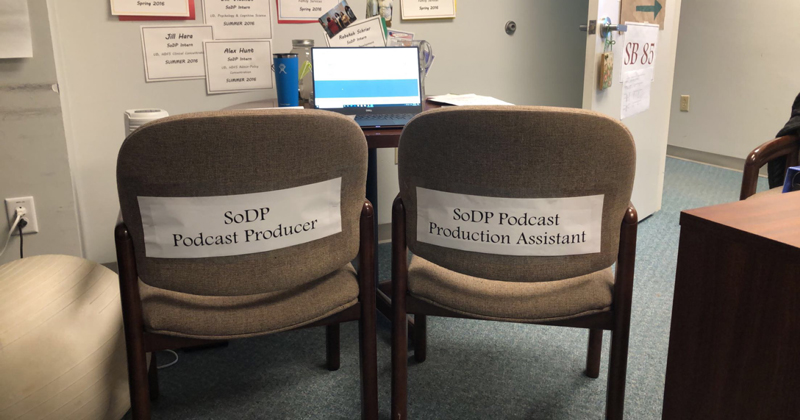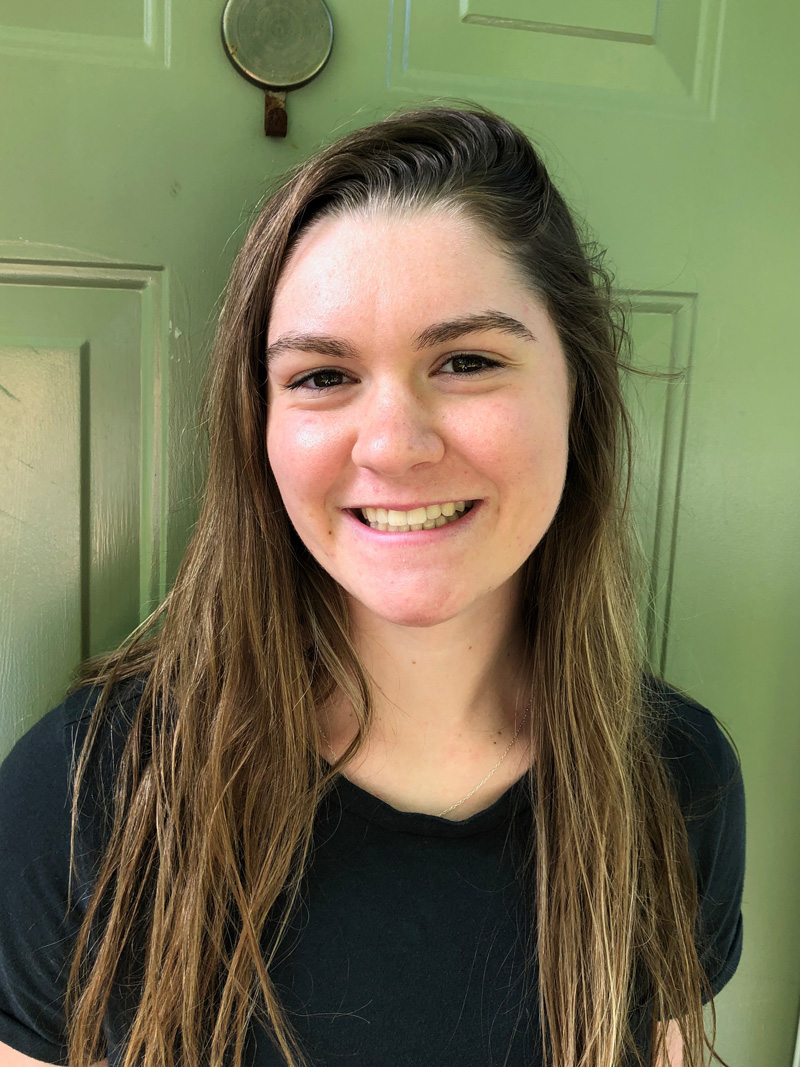


Honors for engagement
Photos courtesy of Maggie Nelson May 11, 2020
Associate in Arts student awarded Newman Civic Fellowship
The first thing Maggie Nelson did when she arrived as a first-year student at the University of Delaware’s Associate in Arts Program (AAP) in Wilmington was meet her new neighbors. Once she’d met them, she went to work with them.
So far in her college career, Nelson has planted a community garden at the YWCA Home-Life Management Center, worked with the Delaware Center for Justice to produce a podcast about the school-to-prison pipeline and collaborated on a documentary chronicling the lives of hospitalized children. In recognition of these projects and her other engaged efforts in her local community, Nelson has been named by Campus Compact as a Newman Civic Fellow for 2020.

Campus Compact is a national coalition of more than 1,000 colleges and universities that encourages civic education through community development. The Newman Civic Fellowship recognizes and supports students who have demonstrated outstanding, ongoing commitment to their communities. Newman Fellows are nominated by their university’s president or chancellor on the basis of their potential for public leadership.
Nelson credits her younger brother with teaching her how closely her life is intertwined with the lives of others. “When I was in fourth grade, my brother Ryan was diagnosed with autism,” she said. “All the meltdowns, outbursts and anger suddenly made sense. I saw facets of autism that are difficult to understand from the outside.”
That understanding led her to participate in the Meadowood Program, an extensive special-needs initiative with full-inclusion classes, in middle school. “Ryan had taught me to see kids in the program for who they were — kids,” she said.
In Nelson’s first year at the AAP’s Wilmington campus, she enrolled in Prof. David Teague’s course, LEAD 100: Leadership, Integrity, and Change. That fall, the class partnered with the YWCA Home-Life Management Center, a facility in downtown Wilmington that helps families in economic crises, to help build a community garden.
AAP faculty and students worked with staff and residents of the center to build the New Beginnings Garden in spring 2018. But the garden faced significant challenges in its first incarnation: not enough sunlight; poor-quality soil. Downtown Wilmington is known for being a “food desert,” and the garden’s initially low yields were disappointing.
Nelson, however, was determined to make the garden a success. She recognized that it was much more than just a source of healthy food — it also offered a place of healing for the Home-Life Management Center’s residents, many of whom were victims of domestic abuse and other trauma.
Nelson had years of gardening experience from volunteering with the Delaware Nature Society, and she put that to good use, enlisting five other AAP students and making major changes.
After months of hard work, the New Beginnings Garden that Nelson worked to redesign had its own new beginning. By July, the garden had yielded more than 60 pounds of produce, with more on the way. Residents at the YWCA center helped to maintain the garden, and parents were surprised to see their children suddenly excited about eating the squash, peppers and tomatoes they had helped to produce.
The successful team effort that brought the New Beginnings Garden into existence laid the foundation for further collaborations, too. The site is now home to several beehives, tended to by AAP students in Prof. Dan McDevit’s ecology course on local ecosystems, and Wilmington’s entrepreneurial-leadership students now package and distribute the honey to local nonprofits.
At the beginning of the fall 2019 semester, Nelson undertook an independent study project at the Delaware Center for Justice, a criminal-justice reform institution in Wilmington, and worked alongside the director of the School Offense Diversion Program. The program works to help students who have been funneled into the juvenile justice system at a young age, often for minor, nonviolent offenses. This phenomenon, which drastically increases the students’ likelihood of reincarceration as both juveniles and adults, is often referred to as the “school-to-prison pipeline.”
Nelson worked to document, via a podcast, the experiences of Delaware students caught in the pipeline. She hopes to continue this work in the future, creating in-school diversion programs that resolve conflicts before students are charged — “reimagining the school discipline process to work for kids, not against them,” she said.
She has presented her findings to the Wilmington Civic Advisory Council and the Louis Redding Consortium for Educational Equity. The data she has gathered has influenced strategic planning at the Delaware Center for Justice.
The personal accounts that Nelson has documented in her podcast have the potential to effect lasting legislative change, and she says she will continue to make sure that these voices are heard. “These are the kids I grew up with,” she said.
Nelson’s capacity for empathy has found additional creative outlets since then. In fall 2019, she worked with fellow Wilmington AAP student Nada Abuasi to compose a voice-over poem for a video documentary produced by Daniel Mpilo Richards, visiting artist at UD and the A.I. DuPont Hospital for Children, chronicling the experiences of the hospital’s pediatric patients.
Nelson has personal insight into that world: In high school, she was diagnosed with Hashimoto’s disease, an autoimmune disorder that can cause a multitude of health problems, from hypothyroidism to potentially fatal neurological complications. While her condition is now well managed, she still clearly remembers her experiences with the illness and wanted to give a voice to children dealing with their own health problems.
As she prepares to transition to UD’s main campus in Newark for the fall 2020 semester, Nelson looks forward to further work with the northern Delaware community.
“I have chosen a communication major with a minor in journalism so I can advocate for others who are unable to advocate for themselves,” she said.
She has the support of UD President Dennis Assanis in doing so. “Maggie has emerged as one of UD’s exceptional student leaders in the field of community engagement,” Assanis said. “Her ability to understand and honor experiences outside hers and her passion for providing concrete opportunities and voices for people inform her academic preparation to use investigative journalism to create change.”
Contact Us
Have a UDaily story idea?
Contact us at ocm@udel.edu
Members of the press
Contact us at 302-831-NEWS or visit the Media Relations website

